|
|
|
Sort Order |
|
|
|
Items / Page
|
|
|
|
|
|
|
| Srl | Item |
| 1 |
ID:
145677
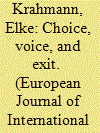

|
|
|
|
|
| Summary/Abstract |
Promoting Private Security Company (PSC) self-regulation has become a key focus due to high profile scandals during the military interventions in Iraq and Afghanistan. Related efforts include the Montreux Document, the International Code of Conduct for Private Security Service Providers (ICoC), American National Standards Institute/ASIS certification, and the new International Standards Organization (ISO) Management System Standard for Private Security Operations. Implicit in industry self-regulation, however, is the assumption that the consumers of private security services will help facilitate and enforce professional standards by shifting their custom to PSCs which have signed up to these codes of conduct or certification schemes. This article investigates the validity of this assumption with regard to government contracting. To what degree are public agencies able – and willing – to let professional standards guide their contracting behaviour? To answer this question, this article develops a general framework for the analysis of public consumer influence through choice, voice, and exit which draws on insights from microeconomics and Albert Hirschman’s classical treatise Exit, Voice, Loyalty. Taking the United States government as an illustrative example, the analysis observes several obstacles to encouraging security industry self-regulation through consumer power.
|
|
|
|
|
|
|
|
|
|
|
|
|
|
|
|
| 2 |
ID:
145679
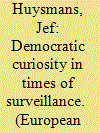

|
|
|
|
|
| Summary/Abstract |
Taking my cue from feminist curiosity and literature on the everyday in surveillance studies, I am proposing ‘democratic curiosity’ as a tool for revisiting the question of democracy in times of extitutional surveillance. Democratic curiosity seeks to bring into analytical play the social and political power of little nothings – the power of subjects, things, practices, and relations that are rendered trivial – and the uncoordinated disputes they enact. Revisiting democracy from this angle is particularly pertinent in extitutional situations in which the organisation and practices of surveillance are spilling beyond their panoptic configurations. Extitutional surveillance is strongly embedded in diffusing arrangements of power and ever more extensively enveloped in everyday life and banal devices. To a considerable degree these modes of surveillance escape democratic institutional repertoires that seek to bring broader societal concerns to bear upon surveillance. Extitutional enactments of democracy then become an important question for both security and surveillance studies.
|
|
|
|
|
|
|
|
|
|
|
|
|
|
|
|
| 3 |
ID:
145680
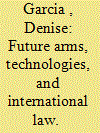

|
|
|
|
|
| Summary/Abstract |
This article presents an initial discussion of the political and legal challenges associated with weaponised technologies in three interconnected areas that may impinge upon the ability to protect civilian populations during peace and war and imperil international security: armed unmanned combat aerial vehicles (commonly known as drones); autonomous weapons systems (known as ‘killer robots’); and the potential militarisation of cyberspace, or its use as a weapon, and the operation of drones and killer robots in the cyber domain. Supporting the argument that the world is ‘facing new methods of warfare’ and that international security governance and law are not keeping up, the article provides an overview and interpretation of three technologies in connection with aspects of five branches of law: state responsibility, use of force, international humanitarian law, human rights law, and law of the commons. I argue therefore that ‘preventive security governance’ could be a strategy to curtail uncertainty in the preservation of stability and international order. I define ‘preventive security governance’ as the codification of specific or new global norms, arising from existing international law that will clarify expectations and universally agreed behaviour on a given issue-area. This is essential for a peaceful future for humanity and for international order and stability.
|
|
|
|
|
|
|
|
|
|
|
|
|
|
|
|
| 4 |
ID:
145676
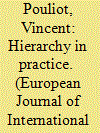

|
|
|
|
|
| Summary/Abstract |
In today’s world, a significant portion of international security politics is conducted through multilateral channels, often from the halls of international organisations such as the United Nations or NATO. This article theorises and empirically documents the production, reproduction, and contestation of local diplomatic hierarchies that practitioners often call ‘international pecking orders’. According to conventional wisdom in IR, the sources of international hierarchies are primarily structural, stemming from the interstate distribution of (material) capabilities. Yet the growing prevalence of multilateral diplomacy in the governance of international security generates distinctive forms of social stratification organised around a struggle for diplomatic competence. As they pursue their instructions and manage security politics, state representatives posted to international organisations make use of the opportunities and constraints of a given situation and compete for rank through the display of practical know-how. The article illustrates this process by looking at how a key set of multilateral practices lend themselves to pecking order dynamics, from esprit de corps to reporting through brokering. By taking the multilateralisation of security politics seriously, the article shows that international hierarchy, far from an unobservable reality, is actually part of parcel of each and every practice that makes the world go round.
|
|
|
|
|
|
|
|
|
|
|
|
|
|
|
|
| 5 |
ID:
145681
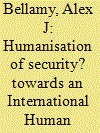

|
|
|
|
|
| Summary/Abstract |
Over the past few decades, genocidal killing and other mass atrocities have become less frequent and less lethal. At the same time, collective international responses have become more common and more comprehensive. What explains these two phenomena, and are they connected? This article suggests that the evidence of declining mass violence and growing international activism is not only compelling but that the two phenomena are connected by the emergence of a new international human protection regime. The article proceeds in three parts. The first examines the evidence for thinking that the world is experiencing both a decline in mass violence and an increase in international activism in response to such violence. The second outlines the emergence, scope, and limits of the human protection regime. The third considers whether the regime itself is associated with the changing practices of third parties to mass violence. The fourth part contrasts this explanation with potential alternatives.
|
|
|
|
|
|
|
|
|
|
|
|
|
|
|
|
| 6 |
ID:
145678


|
|
|
|
|
| Summary/Abstract |
A political spring is an abrupt, broad, sustained increase in public dissent in a state that has prohibited it, as in Czechoslovakia in 1968 or Tunisia in early 2011. Some springs produce offspring – clusters of events within neighbouring states (civic unrest, increased state repression, co-option of dissent, revolution) and among those states (intensification of international rivalries, foreign interventions). An English Spring in 1558–9 produced such a cluster in Northwestern Europe. This article addresses the underlying causal mechanism connecting springs and their offspring, rather than the related correlational question (viz. under what conditions a spring is followed by offspring). That mechanism is transnational group polarisation, or the progressive separation of preferences across a population into pro- and anti-government groups. Transnational polarisation along a pro-versus-anti-government axis is an endogenous process triggered by exogenous events, such as violence or public demonstrations that raise the status of, or threat to, one of the groups. It presents powerful actors across states with new threats and opportunities and can help explain how the Tunisian Spring of early 2011 produced throughout the Arab Middle East infectious unrest, serial repressions and reforms, heightened international tensions, and foreign interventions.
|
|
|
|
|
|
|
|
|
|
|
|
|
|
|
|
|
|
|
|
|